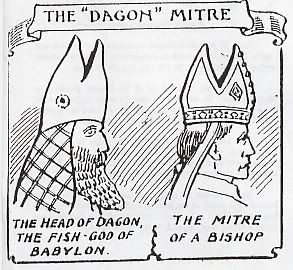From {
Wikipedia}:
Cultural and linguistic background
It is generally accepted that Jesus was born a Jew, and grew up in a Jewish family in Judea. For over a half-millennium, the colloquial language for Palestinian Jews was Judeo-Aramaic,[1] stemming from the Babylonian captivity and invading Assyrian empire. Judeo-Aramaic was a version of standard Aramaic (which had originally been the language of Damascus) with a number of Hebrew words and some Hebrew-inspired grammar mixed in; the relation of Judeo-Aramaic to standard Aramaic is roughly comparable to the relation of Yiddish to German, although the difference between Judeo-Aramaic and standard Aramaic was less marked. For some Jews Hebrew remained a colloquial language, until the end of the 3rd century AD.[citation needed] Nearly all of the Jewish scriptures were written in Hebrew, making it likely that a Jew who knew the Jewish scriptures also knew at least some Hebrew (especially as Hebrew and Aramaic are fairly cognate). There were also the Targums, Aramaic translations of the Hebrew Bible, in Galilee or Judea in the days of Jesus during the Early Roman Period. The use of Targums in the synagogue did not become customary until the 3rd century, after the use of spoken Hebrew declined in the aftermath of the catastrophic Bar Kochba Revolt.
From the 2nd century BC, Palestine had been heavily influenced by the Hellenistic civilization, and Koine Greek rapidly became the international language of the eastern Mediterranean, and so became the language of travelling merchants. It is thus likely that Jesus knew a few Greek terms. The New Testament itself, in the form we have it today, is mostly written in Koine Greek, including many quotations from the Hebrew Bible.
When Jesus is described by the New Testament as quoting from the Hebrew Bible, the quotations that are given most closely correlate with the Septuagint. Most scholars suggest that the New Testament authors most likely used an edition of the Septuagint, rather than translate a Hebrew (or Aramaic) source. However, among the Dead Sea Scrolls, in addition to various Hebrew versions of the Bible that resemble the much later Masoretic text, there are also Hebrew versions that more closely resemble the Greek Septuagint version (in similar fashion to the Samaritan Pentateuch).
Because of the influence of Greek in the east of the Mediterranean, even the officials of the Roman Empire did not really use Latin in the region, and so only a few words of Latin would have been known to most Jews, mostly confined to various symbols of Roman rule (such as the 'denarius' coin).
Aramaic phrases in the Greek New Testament
The Greek New Testament transliterates a few words and phrases, some Hebrew, some Aramaic and some either. These are mainly words attributed to Jesus, and perhaps had a special significance because of this. Words necessarily deriving from Hebrew (like Hosha` nā! "Please, save!") are hypothesized to be loan words from Hebrew for use in Aramaic.
A small minority believe that most or all of the New Testament was originally written in Aramaic. This position, called Aramaic primacy, is popular, but most scholars believe that the New Testament, as we have it today, was composed in the Greek language. However, it is not disputed that there does exist a Hebrew/Aramaic layer beneath the Greek text.
Talitha qoum (Ταλιθα κουμ)
Mark 5:41
- And taking the hand of the child, he said to her, "Talitha koum", which is translated, "Little girl, I say to you, get up".
This verse gives an Aramaic phrase, attributed to Jesus in the resurrection of a girl, with a transliteration into Greek, as ταλιθα κουμ.
A couple of Greek manuscripts (Codex Sinaiticus, Codex Vaticanus) of Mark's Gospel have this text, but others (Codex Alexandrinus, the Majority Text and the Vulgate) write κουμι (koumi) instead. The latter became the Textus Receptus, and is the version that appears in the Authorised Version.
The Aramaic is ţlīthā qūm. The word ţlīthā is the feminine form of the word ţlē, meaning "young". Qūm is the Aramaic verb 'to rise, stand, get up'. In the feminine singular imperative, it was originally 'qūmī'. However, there is evidence that in speech the final -ī was dropped so that the imperative did not distinguish between masculine and feminine genders. The older manuscripts, therefore, used a Greek spelling that reflected pronunciation, whereas the addition of an 'ι' was perhaps due to a bookish copyist.
In Aramaic, it could be טליתא קומי or טלתא קומי.
Ephphatha (Εφφαθα)
Mark 7:34
- And looking up to heaven, he sighed and said to him, "Ephphatha", which is 'be opened'.
Once again, the Aramaic word is given with an attempted transliteration, only this time the word to be transliterated is more complicated. In Greek, the Aramaic is written εφφαθα. This is from the Aramaic 'ethpthaħ', the passive imperative of the verb 'pthaħ', 'to open'. The guttural 'ħ' was generally softened in Galilean Aramaic,[2].
In Aramaic, it could be אתפתח.
Abba (Αββα)
Mark 14:36
- And he said, Abba, Father, all things are possible unto thee; take away this cup from me: nevertheless not what I will, but what thou wilt.
Abba, an Aramaic word (written Αββα in Greek, and 'abbā in Aramaic), is immediately followed by the Greek equivalent (Πατηρ) with no explicit mention of it being a translation. The phrase Abba, Father is repeated in Romans 8:15 and Galatians 4:6.
In Aramaic, it could be אבא.
Note, the name Barabbas is a Hellenization of the Aramaic Bar Abba (בר אבא), literally, "Son of the Father", but here Abba is probably the diminutive form of the Hebrew name Abraham, like Akiba is of Yaakob.
Raca (Ρακα)
Matthew 5:22
- But I say unto you, That whosoever is angry with his brother without a cause shall be in danger of the judgment: and whosoever shall say to his brother, Raca, shall be in danger of the council: but whosoever shall say, Thou fool, shall be in danger of hell fire.
Raca, or Raka, in the Aramaic of the Talmud means empty one, fool, empty head.
In Aramaic, it could be ריקא or ריקה.
Note: The phrase "without a cause" is missing from Matthew 5:22 in the Codex Sinaiticus and the Codex Vaticanus.
Mammon (Μαμωνας)
-
Gospel of Matthew 6:24
- No one can serve two masters: for either they will hate the one, and love the other; or else they will hold to the one, and despise the other. You cannot serve God and mammon.
Luke 16:9-13
- And I say unto you, Make to yourselves friends of the mammon of unrighteousness; that, when ye fail, they may receive you into everlasting habitations. He that is faithful in that which is least is faithful also in much: and he that is unjust in the least is unjust also in much. If therefore ye have not been faithful in the unrighteous mammon, who will commit to your trust the true riches? And if ye have not been faithful in that which is another man's, who shall give you that which is your own? No servant can serve two masters: for either he will hate the one, and love the other; or else he will hold to the one, and despise the other. Ye cannot serve God and mammon.
2 Clement 6
- Now the Lord declares, "No servant can serve two masters." If we desire, then, to serve both God and mammon, it will be unprofitable for us. "For what will it profit if a man gain the whole world, and lose his own soul?" This world and the next are two enemies. The one urges to adultery and corruption, avarice and deceit; the other bids farewell to these things. We cannot, therefore, be the friends of both; and it behoves us, by renouncing the one, to make sure of the other. Let us reckon that it is better to hate the things present, since they are trifling, and transient, and corruptible; and to love those [which are to come,] as being good and incorruptible. For if we do the will of Christ, we shall find rest; otherwise, nothing shall deliver us from eternal punishment, if we disobey His commandments. (Roberts-Donaldson)
In Aramaic, it could be ממון.
In the New Testament the word Μαμωνᾶς — Mamōnâs — is declined like a Greek word, whereas many of the other Aramaic words are treated as indeclinable foreign words.
Rabboni (Ραββουνει)
John 20:16
- Jesus saith unto her, Mary. She turned herself, and saith unto him, Rabboni; which is to say, Master. (KJV)
Also in Mark 10:51. Hebrew form rabbi used as title of Jesus in Matthew 26:25,49; Mark 9:5, 11:21, 14:45; John 1:49, 4:31, 6:25, 9:2, 11:8.
In Aramaic, it could be רבוני.
Maranatha (μαρανα θα)
-
Didache 10 (Prayer after Communion)
- .. Let grace come, and let this world pass away. Hosanna to the God (Son) of David! If any one is holy, let him come; if any one is not so, let him repent. Maranatha. Amen. (Roberts-Donaldson)
1 Corinthians 16:22
- If any man love not the Lord Jesus Christ, let him be Anathema Maranatha.
In Aramaic (מרנא תא) it means Lord, come! or Our Lord, come!
Eli Eli lema sabachthani (Ηλει Ηλει λεμα σαβαχθανει)
Matthew 27:46
- Around the ninth hour, Jesus shouted in a loud voice, saying "Eli Eli lema sabachthani?" which is, "My God, my God, why have you forsaken me?"
Mark 15:34
- And at the ninth hour, Jesus shouted in a loud voice, "Eloi Eloi lema sabachthani?" which is translated, "My God, my God, for what have you forsaken me?"
This phrase, shouted by Jesus from the cross, is given to us in these two versions. The Matthean version of the phrase is transliterated in Greek as ηλει ηλει λεμα σαβαχθανει. The Markan version is similar, but begins ελωι ελωι (elōi rather than ēlei).
The lines seems to be quoting the first line of Psalm 22. However, he is not quoting the canonical Hebrew version (êlî êlî lâmâ `azabtânî), but is using an Aramaic translation of it (see targum).
In the following verse, in both accounts, some who hear Jesus' cry imagine that he is calling for help from Elijah (Eliyyâ). This is perhaps to underline the incomprehension of the bystanders about what is happening. Matthew's use of ηλι may indicate a more 'official' rendition of the psalm verse, more in line with the Hebrew. Mark's version probably represents the Aramaic colloquial better. The Aramaic behind Matthew is êlî êlî lmâ švaqtanî. Whereas Mark has elohî elohî.
A few ancient Greek manuscripts show signs of trying to normalise this text. For instance, the peculiar Codex Bezae renders both versions with ηλι ηλι λαμα ζαφθανι (ēli ēli lama zaphthani).
As the phrase is clearly translated into Greek in both instances there can be little doubt as to its meaning. However, a minority have speculated on different meanings. Among them is George Lamsa, whose research is generally considered pseudoscience by other scholars.[3][4]
The Aramaic word švaqtanî is based on the verb švaq, 'to allow, to permit, to forgive, and to forsake', with the perfect tense ending -t (2nd person singular: 'you'), and the object suffix -anî (1st person singular: 'me').
This phrase is treated in more depth at Last sayings of Jesus.
In Aramaic, it could be אלהי אלהי למא שבקתני.
Jot and tittle (ἰῶτα ἓν ἢ μία κεραία)
Matthew 5:18
- For assuredly, I say to you, till heaven and earth pass away, one jot or one tittle will by no means pass from the Law (that is, the Torah) till all is fulfilled.
The quotation uses them as an example of extremely minor details. In the Greek original translated as English jot and tittle is found iota and keraia. Iota is the smallest letter of the Greek alphabet (ι), but since only capitals were used at the time the Greek New Testament was written (Ι), it probably represents the Aramaic yodh (י) which is the smallest letter of the Aramaic alphabet. Keraia is a hook or serif, possibly accents in Greek but more likely hooks on Aramaic letters, (ב) versus (כ), or additional marks such as crowns (as Vulgate apex) found in Jewish Bibles. The standard reference for NT Greek is A Greek-English Lexicon of the New Testament and other Early Christian Literature, Bauer, Gingrich, Danker, et al. (commonly known as the Bauer lexicon. Liddell and Scott Greek-English Lexicon for keraia is here: [1]. See also the article on the antithesis of the Law.
Korbanas (κορβανας)
Matthew 27:6
- But the chief priests, taking the pieces of silver, said, ‘It is not lawful to put them into the treasury, since they are blood money.’
In Aramaic (קרבנא) it refers to the treasury in the Temple in Jerusalem, derived from the Hebrew Corban (קרבן), found in Mark 7:11 and the Septuagint (in Greek transliteration), meaning religious gift.
The Greek κορβανᾶς is declined as a Greek noun.
Sikera (σικερα)
Luke 1:15
- for he will be great in the sight of the Lord. He must never drink wine or strong drink; even before his birth he will be filled with the Holy Spirit.
In Aramaic (שכרא) it means barley beer, from the Akkadian shikaru.
Hosanna (ὡσαννά)
Mark 11:9
- Then those who went ahead and those who followed were shouting, Hosanna! Blessed is the one who comes in the name of the Lord!
According to the Bauer lexicon, see references at end, this word is derived from Aramaic (הושע נא) from Hebrew (הושיעה נא) (Psalm 118:25, הוֹשִׁיעָה נָּא, meaning "help" or "save, I pray", "an appeal that became a liturgical formula; as part of the Hallel ... familiar to everyone in Israel."
---
References
All Aramaic words are from A Greek-English Lexicon of the New Testament and Other Early Christian Literature, Bauer-Arndt-Gingrinch-Danker (ISBN 978-0226039336). Though primarily a Koine Greek Lexicon (it is the standard reference for NT Greek), it includes Aramaic words in the Aramaic "square-script" alphabet.
- ^ Casey, P.M., 2002. An Aramaic Approach to Q: Sources for the Gospels of Matthew and Luke. Cambridge : Cambridge University Press.
- ^ Kutscher, E.Y.. (1976). Studies in Galilean Aramaic.
- ^ Review of Lamsa's translation by Herbert G May, Journal of Bible and Religion, Vol. 26, No. 4, Oct., 1958 (JSTOR)
- ^ Review of Lamsa's translation by PAH de Boer, Vetus Testamentum, Vol. 8, Fasc. 2, Apr., 1958 (JSTOR)
- ^ Bauer's Lexicon: Gal 1:18; 2:9,11,14; 1Cor 1:12; 3:22; 9:5; 15:5; also 1Clement 47:3
- ^ The Comprehensive Aramaic Lexicon - Entry for "ṭbyʾ"





















 , SOL
, SOL  , LA
, LA  , and MI
, and MI  . The repertory includes psalm tunes, fuging tunes, odes and anthems by the first American composers (1770-1810), and also settings of folk songs and revival hymns (1810-1860). The current
. The repertory includes psalm tunes, fuging tunes, odes and anthems by the first American composers (1770-1810), and also settings of folk songs and revival hymns (1810-1860). The current 




